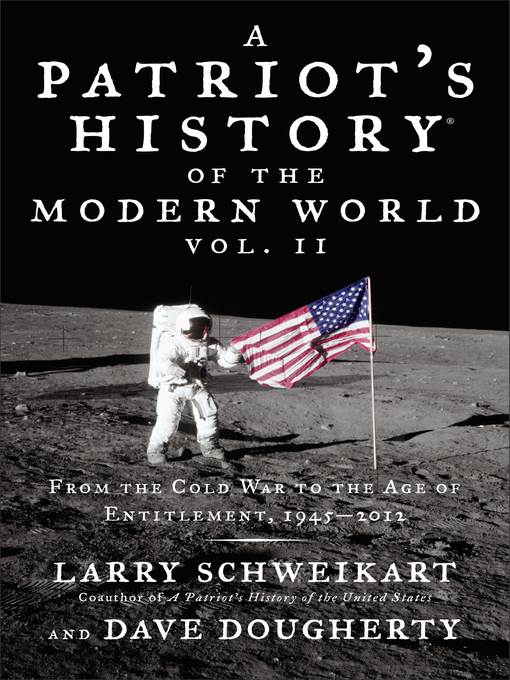
Patriot's History® of the Modern World, Volume II
From the Cold War to the Age of Entitlement, 1945-2012
کتاب های مرتبط
- اطلاعات
- نقد و بررسی
- دیدگاه کاربران
نقد و بررسی

October 7, 2013
Rock-ribbed Americanism confronts communism abroad and liberalism at home in this conservatives’ chronicle of post-war history. Schweikart and Dougherty (A Patriot’s History of the Modern World, Vol. I) continue their account of how an “American exceptionalism” based on Christianity, private property, common law, and free markets shaped the world. Their narrative is equal parts glory and gloom, as America leads the capitalist democracies to victory over the communist bloc in the Cold War only to be undermined by a degenerate welfare-state socialism pushed by domestic progressives advocating “the soft slavery of entitlements and the silver shackles of government support.” The authors’ sweeping panorama takes in war, geopolitics, economics, culture, and sexual mores, all filtered through a staunchly conservative viewpoint spiced with polemical digressions on global warming alarmism, diet fads, and other topics. Their critique of left-liberal historiography is spirited—a discussion of Soviet spies in the United States is particularly revealing—but their platform is clear, as when they repeat claims about John Kerry’s Vietnam service and Barack Obama’s birthplace. The result is a history dear to the right-wing audience.

November 15, 2013
Schweikart (History/Univ. of Dayton) and Dougherty follow up the first volume of their Patriot's History of the Modern World (2012) with a disappointing sequel, again stressing above all the unchallenged nature of American exceptionalism. The authors differentiate themselves from more traditional historians, who locate the American exception in the written Constitution, citizens' self-government and the separation of powers. Instead, they adopt a pre-Constitutional frame focusing on "the four pillars of American exceptionalism." These include "common law, a Christian (mostly Protestant) religious culture, access to private property...and free market capitalism," and Schweikart and Dougherty boldly assert that without all four pillars, "no true American style republic could be developed." Many historians would find the authors' thesis unsupportable, and this volume is disappointing mainly since it fails to elaborate how the "four pillars" have played out across the history of the world since 1945. The authors fail to pursue the opportunities to link historical developments to their primary thesis. Chief among these missed opportunities regards Martin Luther King's leadership of the civil rights movement. Schweikart and Dougherty present King as "an Atlanta-born Republican pastor who had a divinity degree from Boston University," but they do not examine how a movement of mainly Protestant Christians, drawing from the nonviolent principles of Mahatma Gandhi, might affect the Protestant cultural requirement of their frame. Equally, they miss the references to King's movement that were so common among Lutheran-influenced protesters in East German nonviolent demonstrations in the late 1980s, and they ignore the impact of U.S. constitutional thinking in post-World War II settlements in Germany and Japan. The authors provide an avalanche of facts, but the causes that could link to their underlying "four pillars" thesis are neither offered nor proven. They conclude with a story from the Bible and compare it to the state of America in 2013, "which wants a government to 'fight our battles' and take care of everyone, needy or not." Right-slanted, monotonous historical reading offering little new, valid insight.
COPYRIGHT(2013) Kirkus Reviews, ALL RIGHTS RESERVED.

December 15, 2013
A sequel to the same-titled volume that covered the years 18981945, this survey rues what the authors regard as the erosion since WWII of American exceptionalism, the idea that this country has a providentially unique role and destiny in the world. This trend has perpetrators in Schweikart and Dougherty's eyes: socialists abroad, progressives at home, and government bureaucrats everywhere, whose ideologies and actions undermine the four elements that constitute their definition of American exceptionalism. In their version of themes familiar to history readersthe Cold War, decolonization, expansion of the welfare state, and the phenomenon of radical Islamthey lament that since 1945, markets are not as free, private property rights are not as secure, common law is not as respected, and Christianity is not as prevalent. Presenting quantities of economic and demographic data to buttress their case, Schweikart and Dougherty clearly worry that the U.S. is declining and that the causes are the growth of the federal government and the coarsening, if not decadence, of popular culture. Readers who share the authors' sentiments will find historical support for their feelings in this work.(Reprinted with permission of Booklist, copyright 2013, American Library Association.)

























دیدگاه کاربران